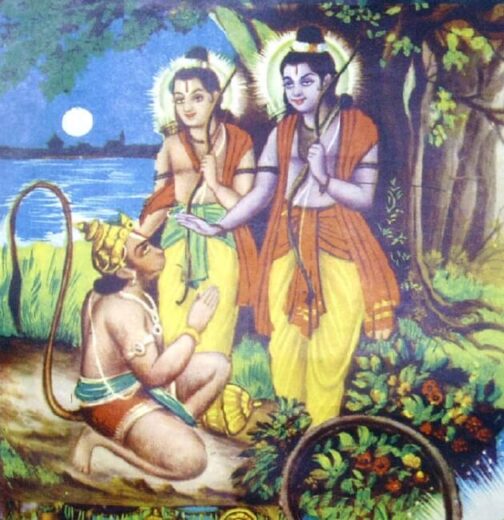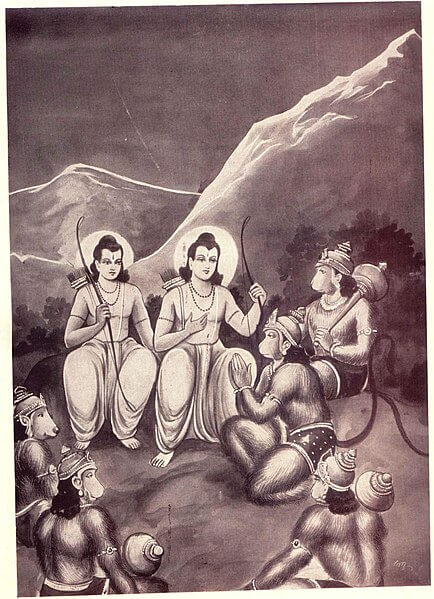Sugriva was generally known as the younger brother of Vali in Ramayana. Both Sugriva and Vali were orphans and brought up by Anusuya and Gauthama Rishi in their Ashram. Since they were orphans, they felt free on holidays and caused mischievous plays in the Ashram of Gautham Rishi. One day, Vriksharaja, the king of Kishkindha, from the kingdom of monkeys, came to the Ashram of Gautham Rishi, and sought these children, for adoption as he was childless then. Gauthama Rishi thought it might be better, to convert Sugriva and Vali as monkeys and offer them to Vriksharaja for their better future prospectus. Since Kishkindha was very rich in fruits and natural seeds, they became happy in the new land, after they were taken over by Vriksharaja.

Vriksharaja was also very careful in bringing them up, regarding provision of physical education and related lessons needed for them. It was the kingdom of monkeys, the borders were frequently under threats by demons and cannibals, and hence Vriksharaja had to be vigilant at all times. Vali grew strong, and Sugriva also had grown alike, and they started to learn practical rules of their country. The duo had maintained their kingdom as an exceptional land, with rich fruits and surplus edible grains. The entire monkeys were vegetarians and there was not even a single animal which ate animal meat, in their country. After their marriage, they cultivated palm trees and grape yards, since the father in law of Vali, Sushena, was a good physician, and adviser of horticulture.
Later, on the other day, a demon, Dundubhi had attacked Kishkindha, and Vali had faced him alone. Sugriva also chased Dundubhi, and the demon had entered into a cave. Sugriva waited at the mouth of the cave. The fight inside the cave could be heard from the palace of Kishkindha and before dying, the demon had created a loud voice imitating like Vali, and the people of Kishkindha including Sugriva thought Vali had died inside the cave. Sugriva waited for a long time and then thought that Vali died, and kept a boulder to the mouth of the cave, which was filled with blood, and returned to the palace. He started ruling Kishkindha, sitting on the throne with his wife and kinsmen.
After some time Vali, tried to come out of the cave by pushing out the heavy stone and felt insulted since he could not find Sugriva there but understood he had started ruling Kishkindha. When he entered the court hall, he found Sugriva was sitting in the middle and to his either sides, Ruma and Tara were sitting. Then he roared inside the court hall loudly and shouted that nobody should be standing up, but Sugriva had already stood up and then Vali declared him as disobedient to him.
Fuming with anger, Vali chased Sugriva with his mace. Wherever Sugriva ran, Hanuman and his followers also ran along for shelter. Whenever he tried to return to his palace, Vali again chased him to kill him.
By running around the universe, he observed that the earth could be circumscribed and he found the sea water flashed like a mirror when he jumped over oceans. He could run through any country of the world. Later the knowledge of various countries, got by such running, helped him to a great extent when he had to search Goddess Sita after abduction by Ravana. Sugriva after issuing his orders for her search, sitting on the Rishyamuka Mountain, elaborated to Rama, how tediously he ran each and every place on earth, jumped over on skies:
नदीश्च विविधाः पश्यन् वनानि नगराणि च ॥ आदर्श तल संकाशा ततो वै पृथवी मया । अलात चक्र प्रतिमा दृष्टा गोष्तवत् कृता ॥
Sugriva explained to Rama: Since Vali had chased me; I had been spared of my life, crossed various Rivers, and had seen many Forests and Cities. I felt as if circumscribing around holy cows feet, had gone round and round the earth. The water below was like a mirror flashing and the earth found spherical to me. Rama could judge his capacity, befitting to search out Sita by his sincere words as above.
Rama had helped Sugriva by killing Vali, hence Sugriva had been crowned, and prince Angada would inherit later Kishkindha.
Sita had been abducted by Ravana and Sugriva helped to restore Sita from Lanka.
Hanuman was the minister to Sugriva. After returning from Lanka, Hanuman joined the palace of Ayodhya to serve Rama. Tara, the widow of Vali served Kishkindha like a minister, since Angada was inexperienced in administration then. It was the order of Sugriva which was very powerful for the developments of their kingdom to be rich in every aspect. The management of Sugriva was flawless and he could order the right task to the right person.

During the search for Sita, he had sent to all the directions his war brigadiers with properly trained troops. He could properly assess the geography of Lanka also.
Nila was the best architect in his country. He had designed the bridge across the ocean to Lanka and he was assisted by two efficient executors, called Mainda and Dwividha. Sugriva was a great warrior also. He had killed Kumbhakarna in the war when his monkeys had run away, to hide from Kumbhakarna.
He had succeeded as per his treaty with Rama and got victory at Lanka against Ravana. During return to Ayodhya, Sugriva and his wife, Ruma had accompanied Rama and Sita, and after Rama’s anointing they returned to Kishkindha.
After passing a long time, Angada started ruling Kishkindha. Sugriva and Ruma had obtained a small baby child from Gauthama Rishi, to adopt as daughter. Then, the Dandakaranya area was ruled by the son of Sahasramukharavana, called Chandragupta. It was under the control of Vibhishana. Surpanakha could not change her habits easily and occasionally visited Janashtana during the period of Chandragupta. Since she failed in the task of abduction of Sita, she thought of revenge again. She could remember the death of Kumbhakarna by Sugriva. One day, she induced Chandragupta and he kidnapped the daughter of Sugriva. Then, Tara advised Ruma not to attack directly on Chandragupta but to seek assistance with the king of Ayodhya.
Then, at Ayodhya, Kusha was ruling and his wife was queen Kumudwathi. Kumudwathi assured Tara to recover the daughter of Sugriva from the custody of Chandragupta. As a brave daughter in law of Sita , Kumudwathi attacked Chandragupta and killed him, recovered the daughter of Sugriva and handed over the baby to him. When the baby was received back, it was suffering from illness due to the bad treatment in Janashtana, at the headquarters of Dandakaranya. Sugriva had shown the baby to Sushena, the physician. Sushena assured them the girl child would be normal if cow milk is regularly fed to her. Then there was no cow in Kishikindha. Sugriva remembered his old minister Hanuman and visited Ayodhya to meet Hanuman. At Ayodhya, he met with Hanuman and told him the requirement of cow milk for his child.
Hanuman discussed the matter with queen Kumudwathi and reminded her that king Bharata had offered him one lakh cows, one hundred villages during the conveyance of the message of returning of Rama to Ayodhya after fourteen years of his exile. Bharata had also assured to arrange to look after those cows, by his wife and sixteen daughters:
गवां शतसहस्रं च ग्रामाणां च शतं परम् । सकुण्डलाः शुभाचारा भार्याः कन्याश्च षोडश ॥
The above Sanskrit verse is from the original Ramayana and the meaning is: Hanuman, I shall offer you, for your joyful message conveyance, one lakh cows, another one hundred villages, wearing earrings, having good characters, my wife as servants to look after them with my sixteen daughters happily. King Kusha had arranged then for one lakh cows, and that breed was named as Amritha Mahal. Kumudwathi had just returned from the south side of Godavary after killing Chandragupta. She calculated and found one hundred villages adjacent to Kishkindha but bifurcated from Dandakaranya by the River towards southern side, then merged, which could be donated.
Hence, one lakh cows of Amrith Mahal breed reached the kingdom of Kishkindha and Queen Mandavi with her sixteen daughters arrived to look after them. Sugriva and Ruma felt happy and thanked Hanuman for his gifts to Kishkindha. The River Kumudwathi got the name after the gift of cows to Kishkindha. Since the hundred villages were grazing land for cows, there were no proper boundaries but generally considered south from River Godavary and stretched beyond the surroundings of Kumudwathy River basin, excluding forests.
Hanuman had gifted one lakh Amrith Mahal cows to Sugriva and then he found the danger of Surpanakha threatening Mandavi and her sixteen daughters. He informed the matter to queen Kumudwathi, daughter in law of Sita. Sugriva had ordered then, Angada and his countrymen, to provide full assistance to queen Kumudwathi to kill Surpanakha. Then Angada entrusted the task to his mother, Tara. In a war meeting with Mandavi, Kumudwathi and her sixteen daughters, it was decided to kill Surpanakha.
One day, Surpanakha again visited Dandakaranya but this time she was accompanied by her co-sister Kumbhini from Lanka. This time, she was faced by the army of Kumudwathi with Mandavi and her sixteen daughters but Tara was hiding to kill these demons. Before start of the physical war, there was the war of words. It was a war by ladies with ladies. Mandavi accused her for killing her own first husband, Vidyujjiva. Then both Kumbhini and Surpanakha wanted to kill all the opposite side ladies.
Sugriva sent for Hanuman from Ayodhya and Hanuman arrived there. He quickly assessed the situations and wanted to provide protection to the cows he had offered to his own country. With his mace, he stood in between two parties of the war. He requested to stop the war of words and not to fight. Kumudwathi agreed for compromise but Surpanakha would not leave her determination unless her desire got fulfilled. Hanuman asked about her desire. Surpanakha told him, she wished Rama to be her husband.
Then the security executives of Kishkindha , Mainda and Dwividha arrived on the spot with Sugriva. Mainda and Dwividha had been assured by Rama that he would again visit them. Hanuman witnessed for the assurance and all of them persuaded Surpanakha to wait and do penance to get Rama as her husband until she would get him, or when Mainda and Dwividha meet again him. She was not ready to wait and declared it may be better to be killed than to wait.
Tara heard her words, liking to embrace death. She thought about her husband who was killed by Rama, in hiding but Vali liked to embrace death from the hands of God Rama. That country was the asset left for Tara by her husband, Vali and she decided her husband would be feeling happy if peace and prosperity existed for which Surpanakha should be killed. Tara had aimed her arrows, one at Surpanakha and the next one to Kumbhini. Surpanakha and Kumbhini died and Tara had thrown the dead bodies of those demons to the sea. Then, Sugriva discussed with Hanuman and wanted to know the reason for the killing of Kumbhini. Hanuman revealed to Sugriva that Kumbhini had come there for kidnapping cows and hence was killed by Tara.
Sugriva requested Hanuman to explain, about the desire of Surpanakha to get Rama as husband. Hanuman knew facts about past and future. He explained. In the next yuga, God would take his incarnation as God Krishna. He would support Pandavas and during the Ashwamedha, the fifth Pandava, Sahadeva would visit Kishkindha and in the war, God Krishna would appear before Mainda and Dwividas as Rama. The Surpanakha would get her rebirth as lady Kubja and do penance again to get God as her husband. Krishna would marry 16008 ladies and Kubja would be one of them. Kubja would see Krishna as Rama alike Mainda and Dwividha.
Sugriva thanked Hanuman. Sugriva and Ruma offered cow milk to their daughter and to Hanuman also. Hanuman blessed their daughter and went to Ayodhya. All the other queens and their daughters returned to Ayodhya later, as Mainda and Dwividha took the responsibilities to look after the Amrith Mahal cows and to utilize the hundred villages as grass land for the Kishkindha country.
It is humbly prayed for the blessings of God Rama upon us.
Next post, being of Secrets of Ayomukhi and Kabandha in Ramayana may not be missed. Swayamprabha in Ramayana would be presented separately in another article.
Readers may provide feedback and share this story with friends and family.

0 Comments
2 Pingbacks